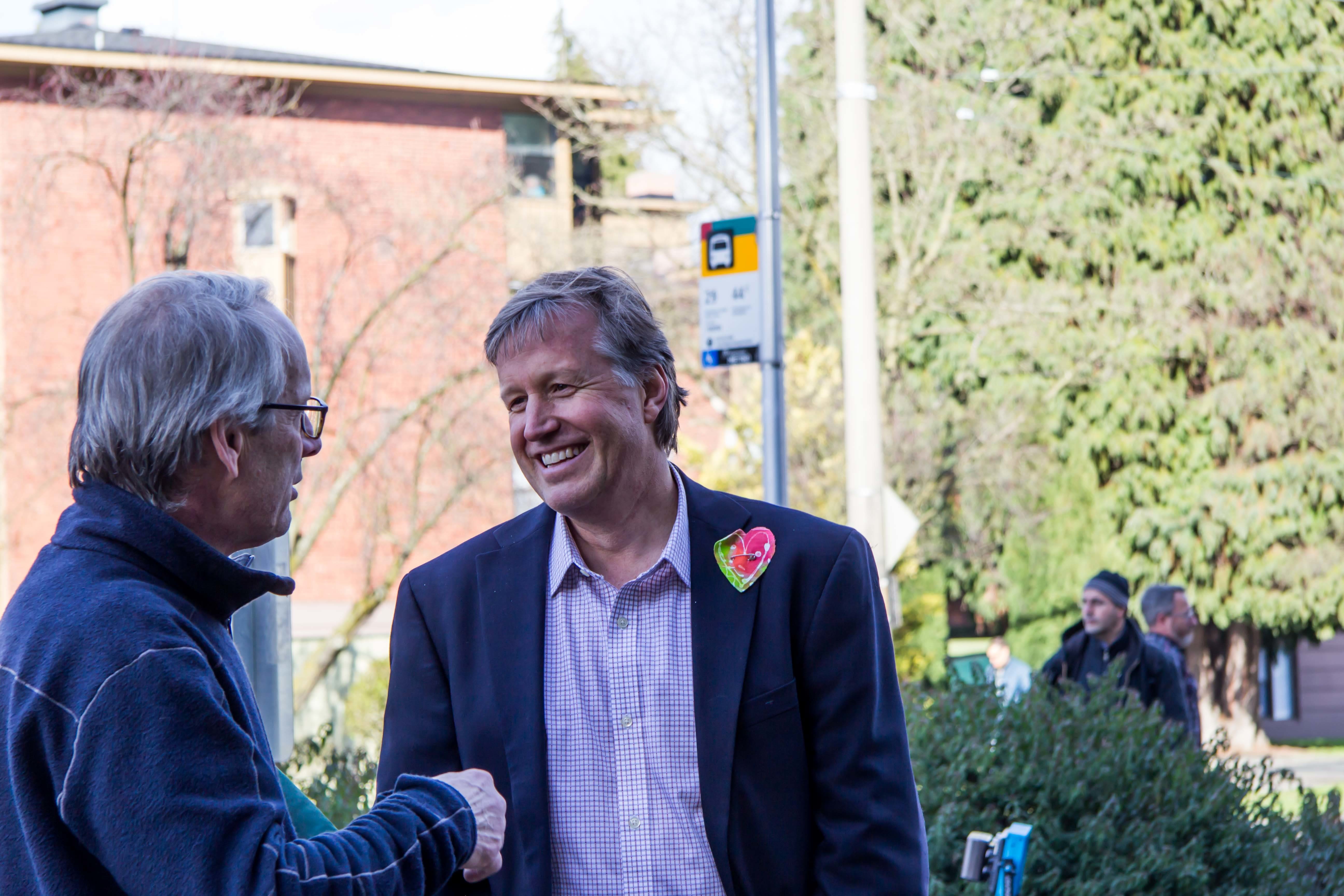Mayor Annouces Plan for 4 New Sanctioned Homeless Encampments, Says He Will Not Permit Camping on Any Parks Land

1. Mayor Ed Murray reframed (hijacked?) the council debate on homeless camping yesterday afternoon, announcing at a press conference that he wants to open four new sanctioned encampments. He also announced that he would ban all camping in parks.
The dramatic announcement, in response to thousands of community emails (lots of them ill-informed) objecting to allowing homeless campers in parks, came just hours after city council members Sally Bagshaw, the council’s human services chair, and Mike O’Brien, the council’s eloquent bleeding heart liberal, had offered two competing proposals about homeless encampments.
Bagshaw’s proposal takes all parks property off the table for camping, whereas O’Brien’s proposal permits camping in remote portions of parks that are inactive and are not being restored. Bagshaw’s proposal prohibits camping on all sidewalks, while O’Brien’s proposal limits the sidewalk ban to sidewalks in front of houses and dwelling units. (Neither proposal allows camping on school grounds.) The other key difference between their proposals has to do with the protocol for removing campers from encampments. For the places that are deemed “unsuitable”—again, all parks and all sidewalks in Bagshaw’s version and some sidewalks and most of parks in O’Brien’s version—the city could remove people immediately. In the remaining areas, confusingly identified as suitable, but unsanctioned, Bagshaw’s version requires social service outreach and offers of other places to stay, and then 72-hour notice before a sweep, while O’Brien’s offers the same outreach and housing offers with 30-day notice of sweeps.
The mayor’s new proposal to open four new encampments, which he says he’s sending to council next week, and which he announced with Bagshaw (and council members Tim Burgess and Debora Juarez at his side), seems to directly address O’Brien’s concern with Bagshaw’s approach, namely, with so many restrictions on where people can camp, where will they go? As O’Brien put it at a press briefing yesterday: “Can you show me that if you do that [ban camping on 100 percent of the city’s greenspaces] that there’s space for the 3,000 people who sleep outdoors…I don’t believe there is.” However, he did add this footnote (a bit skeptically): “I’m willing to be convinced that somehow there’s a bunch of other land that I’m not thinking of.”
And though the mayor hadn’t officially introduced his own proposal yet, O’Brien was also asked about the possibility of opening new sanctioned encampments. It’s worth quoting O’Brien’s response at length because he raises key questions about the actual feasibility of the idea and its effectiveness; he also sneaks in a frankly cutting dig at Ballard residents (currently and Quixotically trying to recall O’Brien) who believe he’s being too permissive about encampments.
O’Brien said:
There’s a couple challenges about doing that. There’s legal challenges. If the city’s actually going to go set up encampments throughout the parks, that is a lot of work, and we would have to go through that and make sure they’re safe. I was working as one of the city representatives to cite a sanction encampment in Ballard for 25 people, it took six months. I’ve got 3,000 people out there. And so yes I’ve heard a lot of people frankly—including many who formally have been opposed to sanctioning encampments—saying sanctioned encampments seem to be working, let’s do more of those.
But right now we have three sanctioned encampments, took us eight to ten years to get those on the books, they hold 125 people. We’ve got 3,000, so it may be that we want to significantly expand sanctioned encampments. Maybe in the next five months we could add 500 spots in sanctioned encampments. That still leaves thousands of people out there. And so there’s lot of things that we could do in the near term, in the medium term, in the long term. But I still have 3,000 people tonight and the problem is those folks don’t know where to go. Some of them were sleeping in the greenbelt above I-5 and they just got kicked out of there. And so they go to the playfield in University District and camp there. And the people in University District go “What is going on? People should not be camping in my park.
Mayor Murray spokesman Benton Strong says the details on the sanctioned encampment locations, capacity, and timing will be announced next week.
Bagshaw, who held a press briefing of her own yesterday where she repeatedly said she had been talking to the mayor about finding space for new sanctioned encampments, is holding a human services committee meeting this morning where council members will take up her proposal and O’Brien’s proposal.
There won’t be a vote on either proposal today.
Erica C. Barnett has a critical report on Murray's announcement.
2. Here’s a quick follow-up to yesterday’s Fizz item about the Steve McLaughlin supporters who canceled a Rainier Club McLaughlin fundraiser because McLaughlin wouldn’t denounce Donald Trump (arch conservative McLaughlin is running for commissioner of public lands.)
Originally, after Trump’s despicable comments about sexually assaulting women went public last Friday, McLaughlin stuck by Trump and told the Seattle Times Trump’s comments were simply “a distraction.” (Several women have since come out and said Trump sexually harassed them.)
Yesterday, McLaughlin, referencing Trump’s vile comments, announced that he “will not support my party’s nominee.”
The fundraiser is still off. I contacted local management consultant William Pickard, the host of the scrapped McLaughlin fundraiser, yesterday (before McLaughlin finally unendorsed Trump). Pickard told me simply:
"No comment. It’s over. We are very disappointed.” And this morning he told me he had "no further comment."
McLaughlin's opponent, environmental advocate Hilary Franz, the executive director of green group Futurewise, belittled McLaughlin's sudden reversal.
My opponent has a disturbing pattern of embracing far right positions, then backing away under pressure. He has attempted to walk back his dangerous affiliations with the Coalition of western States. He has denied the extent of his radical views on public land ownership.
And now, as his presidential candidate implodes, he backs away only after his funders abandon him-- not out of principal for the abusive words and actions of Donald Trump.
This lack of judgement is not the trait of a leader we need in this important office, and is out of touch with the mainstream values of Washington state.




